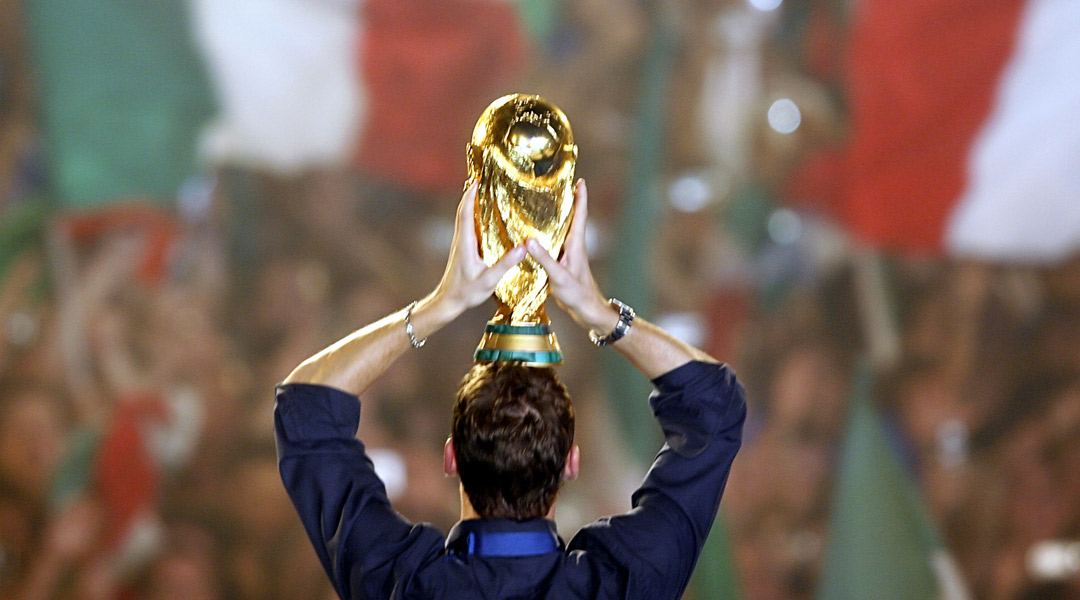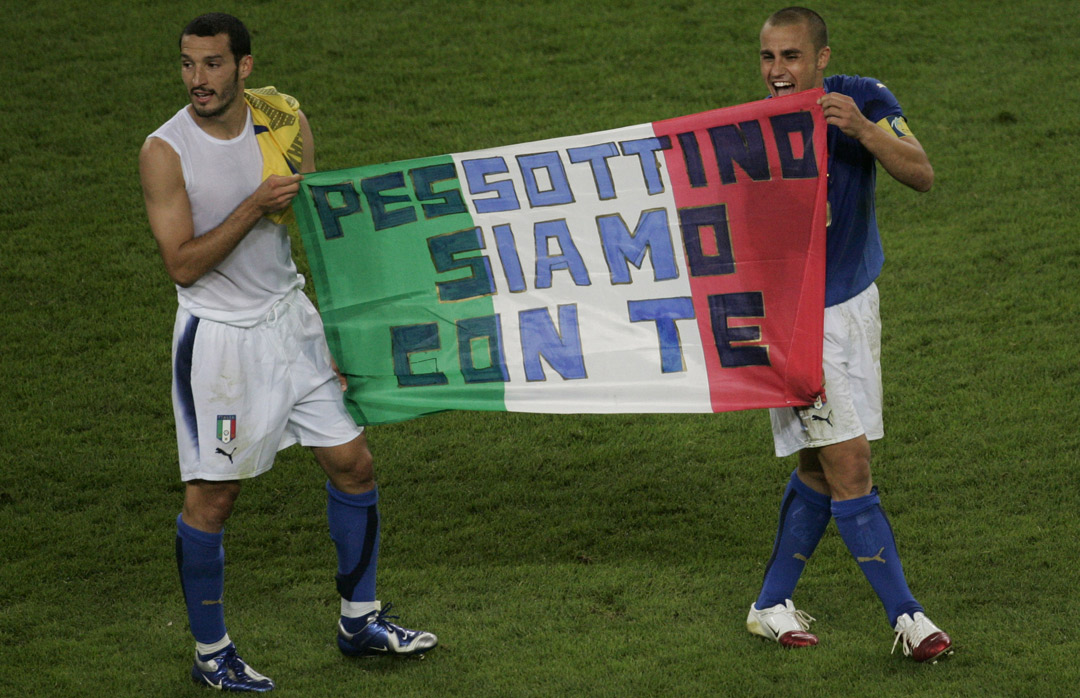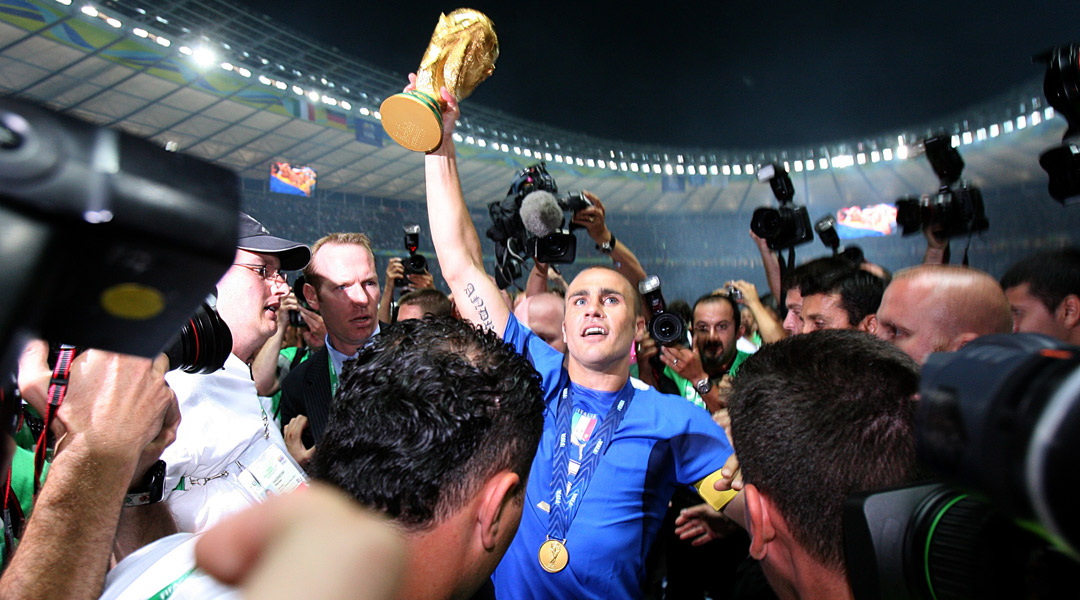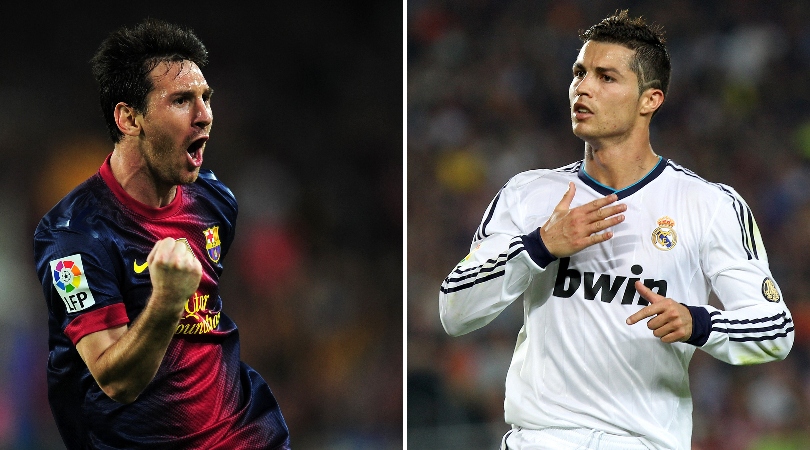World Cup 2006: Italy's band of brothers shrug off Calciopoli bombshell to win big
The country's match-fixing scandal, coupled with the subsequent suicide attempt of Juventus's sporting director, forced the Azzurri come together as one

The pivotal moment in Italy’s 2006 World Cup-winning campaign actually took place 700 or so miles from Berlin, 13 days before the final itself. Gianluca Pessotto, Juventus’s then-sporting director, threw himself from a third-floor window of the club’s HQ, apparently ashamed at his club’s role in the Calciopoli match-fixing scandal, news of which broke just weeks earlier and would see Juve stripped of two Serie A titles and relegated to Serie B.
On the same day, around the same time, Fabio Cannavaro was captaining the Azzurri to victory against Australia in the last 16 in Kaiserslautern. News of his former team-mate’s suicide bid reached the centre-back during the post-match press conference. Ashen-faced, Cannavaro apologised to the world’s media and left the room immediately. Fellow Bianconeri Gianluca Zambrotta and Alessandro Del Piero flew home to be at the bedside of their stricken colleague.
Steady rather than spectacular to that point – although in the best traditions of Italian defending, they’d only conceded one goal – Marcello Lippi’s team moved up a gear in the next round, despatching Ukraine, including Andriy Shevchenko in his pomp, 3-0. After the game, Cannavaro and Zambrotta paraded a banner reading Pessottino siamo con te – 'Pessottino we are with you'.

But, according to Cannavaro – who was undoubtedly the standout player at the tournament (and later nicknamed ‘The Berlin Wall’), despite the strangely sentimental decision by FIFA to award the Golden Ball to Zinedine Zidane just moments after that headbutt – it would be “too easy to put it all down to… Calciopoli”, which implicated clubs that made up 13 of Italy’s winning squad. “In our individual roles we were the strongest in Europe,” he explained to FourFourTwo in 2010. “[Gianluigi] Buffon, [Alessandro] Nesta, [Francesco] Totti, Del Piero, [Andrea] Pirlo, Zambrotta.”
Collective effort
Throw in Cannavaro himself, and the only surprising thing about Italy’s victory in hindsight is that they weren’t among the bookmakers’ favourites in the first place.
With left-back Fabio Grosso proving the revelation of the tournament – scoring the extra-time winner in the semi-final and the winning penalty in the final’s shootout – and all of Italy’s strikers – Filippo Inzaghi, Alberto Gilardino, Vincenzo Iaquinta and first-choice centre-forward Luca Toni, as well as Totti and Del Piero – all finding the net at least once, it would have been harder not to win it.
Get FourFourTwo Newsletter
The best features, fun and footballing quizzes, straight to your inbox every week.
Victory, though, was as much about ‘the team’ as the individuals. “To truly understand you need to be part of it,” Cannavaro told FFT. “The 2006 group took two years to build – enough time to understand that when one of you is in trouble you can always get support from team-mates, and when you need someone you’ll always have them at your side. And you might not believe it, but in those 40 days [at the 2006 World Cup] we had a lot of fun too.”

You don’t have to look to hard for examples of this togetherness. For a start, Italy used every single outfield player at some point during the tournament, proving nobody, apart from perhaps Cannavaro and Buffon, was irreplaceable.
Injury in the final group game against the Czech Republic would rule Rolls Royce-esque defender Nesta out of the tournament. In stepped Marco Materazzi for the knockout stages, and was promptly – and unfairly – sent off against Australia – in the second round. But he returned after the quarter-final to do far more than just trash talk Zizou into planting his melon between The Matrix’s nipples.
Materazzi combined typically dogged defending with raking, left-footed passes and, lest we forget, crucial goals, including the equaliser in the final and Italy’s second penalty in the shootout. A clumsy tackle on Florent Malouda to concede a penalty in the final was the only real blot on his copybook.
The game against the Socceroos was settled in controversial fashion by a last-minute penalty. And who should be the first person to charge down the touchline to celebrate with scorer Totti? His rival for the trequartista role, Del Piero. Now that’s team spirit.
Goals vs cards
The tournament itself was deemed a great success, with stereotypical German efficiency off the pitch allied with atypical exuberance on it. But as at Euro 96, a giddy host nation – who, like England a decade earlier, lost a pulsating semi-final against the eventual winners – and glorious weather helped provide the illusion of a festival of attacking football.
In fact, only 2.3 goals were scored per game on average, compared with 2.52 four years earlier, with the narrative instead provided by the record number of red and yellow cards handed out.
Not that it made Germany 2006 any less exciting. From Graham Poll’s three yellow cards in one game awarded to Josip Simunic in the group stage, to Zidane’s moment of madness in the final – with Wayne Rooney’s ‘stamp’ on Ricardo Carvalho and the Battle of Nuremburg between Holland and Portugal (four red cards) in the quarter-finals sandwiched in between – this World Cup was as much about indiscipline as it was inspiration. And we absolutely lapped it up.
Still, with all eight seeded teams reaching the last 16 and Europe’s big guns filling the four semi-final berths, there was a feeling of satisfaction among the traditionalists that normal service had been resumed after the shock-fest in South Korea and Japan four years earlier.
As for Italy, their triumph was deserved and, indeed, briefly cathartic: Pessotto survived, recovered and now heads up Juve’s youth teams. But the exodus of players from the Old Lady that summer, including Cannavaro to Real Madrid, in the aftermath of Calciopoli is something from which Calcio has yet to fully recover.
